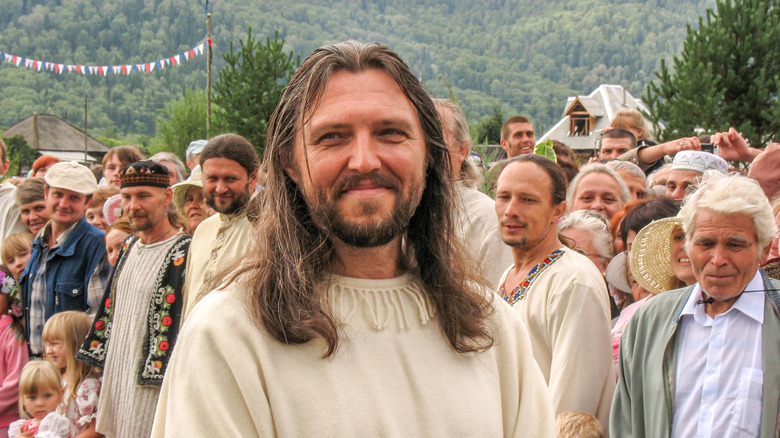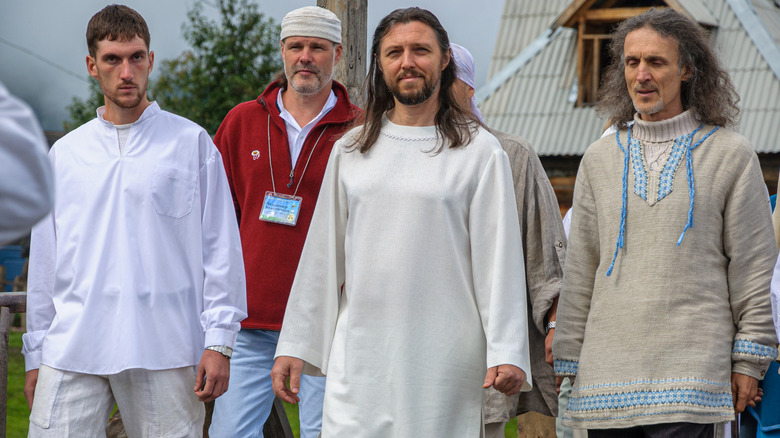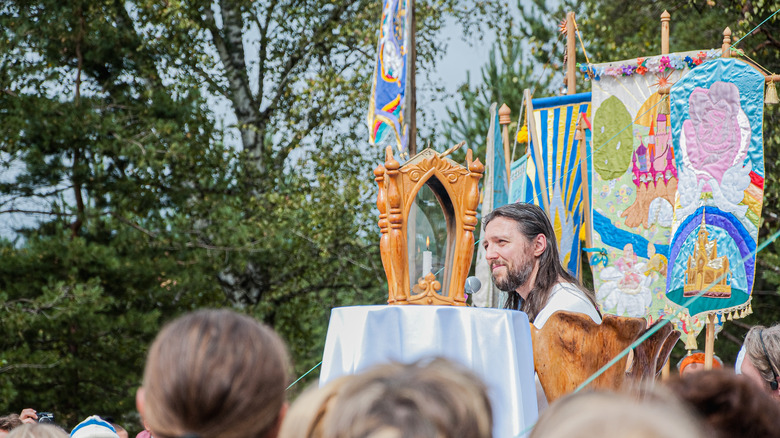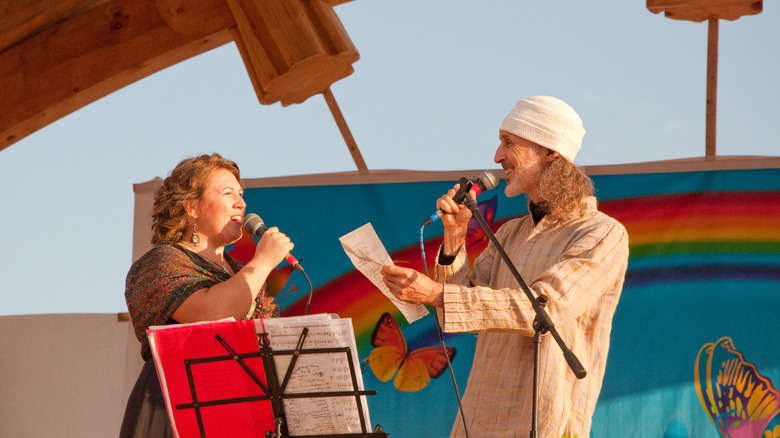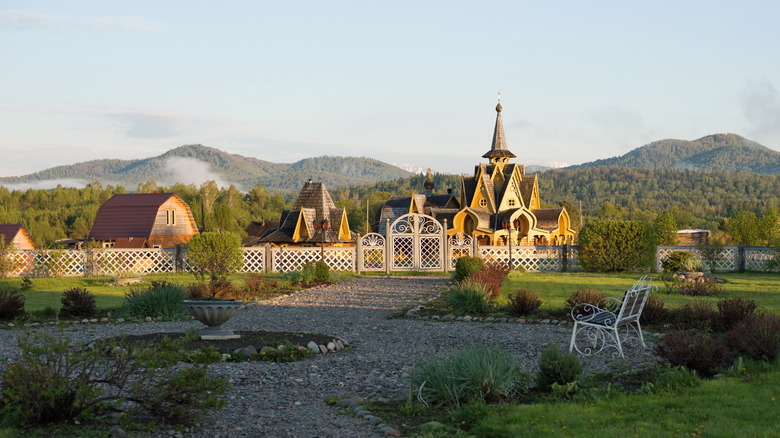How Russian Cult Leader Vissarion, The 'Jesus Of Siberia,' Came To Power
Any time a cult or cult leader crops up on the news, people often mutter the same questions: How is this possible? How could anyone believe this guy? How did he come to power, anyway? The late 20th century saw the rise of big-name, infamous cult leaders like Jim Jones (People's Temple), Charles Mason (the Family), Marshall Applewhite (Heaven's Gate), David Koresh (Branch Davidians), and more. We've even got cults of differing, but recognizable types like the '60s California sex cult variety (Children of God), vaguely cosmic spiritual variety (Church of the Master of Angels), and the 'let's form a blissful commune' variety (Mars Island). Cults sometimes blend elements of some or all of these.
Regardless of specifics, each cult always gives itself a name that defines its group identity. It has a charismatic leader whose word is law. People in the cult don't think they're in a cult. Each cult indoctrinates its followers. The cult exploits and often manipulates people toward some destructive end. All of these traits and more are official, recognizable cult characteristics, as The Guardian outlines. This is why we can arguably even chuck national movements like Stalinist Soviet Union on the list — or Nazi Germany.
One central, key question arises from this information: How do cult leaders come to power? Well, we can take one individual as a good case study: Vissarion, the Jesus of Siberia. As CBS explains, he ruled a legally distinct commune within Russia for over 30 years and was finally arrested in 2020.
Lord, savior, and traffic cop
Looking at pictures of Vissarion, he's certainly gone through the hair-growing lengths necessary to adopt a stereotypically Christ-like look. Whether or not he looked like that when he was a metal worker turned traffic cop named Sergey Anatolyevich Torop is anyone's guess. We don't know much about Torop's early life, although sources like IMDb state that he was born in 1961 in Krasnodar, Russia. He would have taken part in Russia's mandatory military service, which until 1980 was two years in length, per the UN Refugee Agency. When Torop was 18, he wrote home saying, "Unless I become world famous I won't be able to live on this Earth," as Russia Beyond cites. This is our first glimpse into the motivations beneath Torop's holy veneer.
At some point, Torop was fired from his job as a traffic cop, although we don't know why. Jobless, he got involved in a Siberian UFO club while attending some type of rhetoric and psychological persuasion courses. On August 18, 1991, he delivered his first sermon on Siberian television. To this day, Vissarionites celebrate this day as their most sacred annual holiday, the Holiday of Good Fruits, as a Vissarion community site says. In 1991, Torop began wandering around Siberia and collecting followers. By 1994 he'd registered the Church of the Last Testament with the Russian Ministry of Justice as an official religion, and started the forest commune near Petropavlovka village in Siberia's Krasnoyarsk Territory near Lake Tiberkul.
Prophetically well-timed
Torop didn't merely play and look the role of a wandering itinerant prophet, he did so against the "background of economic collapse, the disintegration of the USSR, broken hopes and discredited values," as Russia Beyond puts it. Torop, whose moniker Vissarion means "he who gives new life" in Russian (per All That's Interesting), stepped into the spiritual void left by a crumbling, secular Soviet state of 1991. This isn't conjectured, either. Vissarion said so himself in what might have been his last major media interview with Vice in 2011. He then said, "Magnificent changes in society were essential to destroy the foundation of habitual belief."
That last sentence illustrates another facet of Vissarion's rise to power: his roundabout, semi-incoherent speech. He rarely stated anything directly — in the VICE interview he wouldn't even say his favorite food. His rhetoric left things vaguely mystical enough for his followers to interpret however they wanted. Or as former sermon attendee, Yelena Melnikova said on Russia Beyond, "His manner of communicating his message drove me mad. Going round in circles and beating about the bush."
At the same time, Vissarion edited some sections of the Bible's New Testament to tell the "true story of the First Coming," and then penned a 10-volume sequel. In 2002 he said, "I am the living word of God the father. Everything that God wants to say, he says through me." Eventually, he straight-up declared himself the reincarnation of Jesus.
Power over the people
The Guardian has a nice collection of snapshots from Vissarion's commune, aka "Sun City." The commune looks precisely how you'd imagine: white-robed followers, rustic and hand-built homes, portraits of Vissarion on every wall gazing benignly, and so on. His followers would need portraits, however, because as Vice's 2011 exposé reveals, Vissarion lived away from most of them in a mountain chalet dubbed the "Adobe of Dawn." Like pilgrims, commune dwellers would trek hours up the mountain, singing and playing flutes, passing identity verification checkpoints, just to see Vissarion descend very slowly to a little pavilion with a microphone and deliver a sermon. Then he'd return to his collection of right-hand people, one of whom used to drum in a boy band during the Soviet era, as All That's Interesting notes.
This is all part of the appeal, though. No Vissarionite would ever see their master pick his nose, cough, go to the bathroom, get hungry, etc. He'd appear like a divine vision and then recede. At the same time, Vissarion's followers had the opportunity to craft a pastoral utopia complete with wandering baby goats, hand-grown vegetables, hand-woven blankets, no money or store-bought products, clear gender and work roles, all within a pristine bubble where nothing echoed but the voices of believers. In the Vice exposé, Vissarionites repeat the same thing again and again: "The teacher" gave them answers to all of their questions; the teacher removed all doubt; the teacher gave them a place to be happy.
Cracks in the facade
At this point it might be clear how Vissarion collected almost 5,000 followers to his self-made religion. All the boxes were ticked: personal ambition, good societal timing in 1991, vague-enough messaging, an isolated and idyllic community, ready-made answers for difficult life questions, an aesthetic identifiable with a known religious practice, etc. If Vissarion was merely a motivational speaker? Maybe no harm, no foul. After all, the Church of the Last Testament existed more or less peaceably under the watchful eye of Russia's Federal Security Service (FSB) since 1992, per Russia Beyond.
Cracks in the façade appeared early on, though. Vissarion's beliefs included an impending apocalypse and aliens supervising Earth from orbit, which pressured believers into strict behavior. He also incorporated elements of Hinduism and Buddhism that necessitated veganism and prohibited alcohol and particular foodstuffs, which made Vissarionites' lives tougher. And most pointedly, he promoted polygamy "for the sake of the submissiveness of women." Vissarion himself had six children with two women — one of those wives lived with him from the age of 7. He later married her when she was 19, according to the Daily Mail.
By the time special forces under Russia's Investigative Committee swept into Sun City in 2020, infants in the commune had died from neglect, a follower froze to death in the forest, cancer patients had died from a lack of medical care, and other followers had committed suicide. CBS News shows then-59-year-old Vissarion and two aides sitting on a helicopter side-by-side ski mask-wearing Russian special forces.
A jailed Jesus
As far as we know, Vissarion is currently in jail. The New York Times reported in October 2021 that he was still being held with no trial date set. The Daily Mail shows him sitting handcuffed in a cell — not in a white robe — but a gray sweat-suit. The Russian Investigative Committee officially said that the Church of the Last Testament was "being probed for using 'psychological violence' causing some followers 'serious harm to their health'." They also found rifles and ammo caches on site. Besides this, there are additional and predictable rumors of incest, pedophilia, murder, sex rites, property fraud, and so on, as Russia Beyond cites. If convicted, Vissarion — former traffic cop Sergey Torop – could face up to 12 years in jail.
At the time of the 2020 raid on Sun City, Torop's commune had splintered off into about 20 little communities. Some of these had evolved greatly from the early 1990s days. Wooden shacks transformed into full-on countryside retreats full of multi-story cabins arrayed with solar panels.
Vissarion's rules also grew lax. TVs, cell phones, satellite dishes, football and hockey teams: all this and more became okay. Meanwhile, Vissarion himself appeared in public less and less, and then only to relay a simplified "the end is nigh, but you're safe" schtick. At the same time, local businesses were happy to have the commune around. It gave the local economy a boost, raised regional property values, and kept adjacent villages from wilting on the vine. But as Vissarion's followers can attest, not even paradise can last forever.
